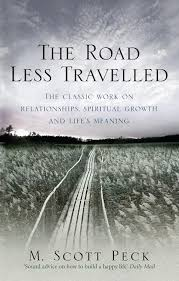BOOK REVIEW: THE ROAD LESS TRAVELLED
The Road Less Traveled by
M. Scott Peck is a profound exploration of life’s challenges and how to
approach them in ways that lead to personal growth and fulfillment. First
published in 1978, this book has remained relevant for its unique blend of
psychology, spirituality, and philosophical insights. Peck begins by asserting
that life is difficult. This simple but powerful statement forms the foundation
of the entire book. He argues that the sooner we accept the inherent challenges
of life, the more effectively we can navigate them. The book revolves around
the idea that personal development requires discipline, love as an intentional
act, spiritual growth, and an openness to grace.
Peck defines discipline as a set of tools we
need to solve life’s problems. He identifies four key practices that help us
confront challenges instead of avoiding them: delaying gratification, accepting
responsibility, a commitment to truth, and balancing various demands. By
applying these practices, individuals can confront their difficulties head-on and
find healthier, more constructive ways to grow. The author emphasizes that
discipline is not about restricting oneself but about taking control of one’s
choices and actions, leading to a more fulfilling and intentional life.
In his discussion of love, Peck redefines it
in a way that goes beyond romantic or sentimental notions. For him, love is
more than just an emotion—it is a choice, an act of will that involves a
commitment to another person’s spiritual and personal growth. This idea
challenges common conceptions of love as something effortless or purely driven
by feelings. Peck describes genuine love as a disciplined act that requires
continuous effort, thoughtfulness, and the capacity to prioritize long-term
growth over immediate pleasure or convenience. By treating love as a deliberate
action, he encourages readers to rethink their relationships and invest in the
deeper, more meaningful connections that come from mutual growth.
The book also delves into the theme of
spiritual growth, which Peck sees as essential for mental health and personal
development. He does not limit spirituality to any specific religion but rather
views it as a process of evolving and expanding one’s consciousness. Peck talks
about the importance of self-examination, embracing change, and the courage to
question deeply held beliefs. In this section, he draws from both psychological
principles and spiritual wisdom, highlighting the interplay between personal
growth and spiritual awakening. For Peck, spiritual growth is about becoming
more aware, more compassionate, and more aligned with the deeper truths of
existence.
In the final section, Peck introduces the
concept of grace, which he describes as an inexplicable force that helps us
grow in ways that we cannot fully understand or control. Grace, in his view, is
an unearned gift that subtly guides us toward healing, growth, and wisdom.
While this part of the book leans into religious language, Peck is careful to
frame grace in a way that can resonate with people regardless of their spiritual
background. He suggests that grace is something mysterious yet real, a force
that operates beyond our conscious control but can profoundly impact our lives
if we remain open to it.
The book is known for its depth and honesty.
Rather than offering quick fixes or superficial advice, The Road Less Traveled
invites readers to engage in serious self-reflection and to embrace the harder,
less conventional paths that ultimately lead to a more meaningful life. Peck’s
writing combines psychological insight with spiritual understanding, making the
book valuable for readers at any stage of their personal journey.
While The Road Less Traveled has
inspired millions, it also has some notable criticisms:
- Overly
Dense and Philosophical: The book is
filled with complex psychological and philosophical discussions that some
readers find heavy, making it challenging to stay engaged. The concepts
require careful reflection, which can be difficult for those looking for
straightforward advice.
- Moralistic
Tone: Critics often point out that Peck’s writing can come
across as overly moralistic and preachy. His emphasis on personal
responsibility and spiritual growth, while valuable, sometimes borders on
prescribing what is “right” or “wrong” in a rigid way, which may not
resonate with everyone.
- Religious
and Spiritual Bias: Although Peck tries to be
inclusive, his views on spirituality are heavily influenced by Christian
mysticism. Readers who are not religious or who follow other spiritual
paths might find the focus on grace, sin, and divine influence less
relevant or off-putting.
- Pacing
and Structure: The book’s structure is sometimes
uneven, with sections that feel disjointed. The transition from
psychological analysis to spiritual discourse can be abrupt, leaving
readers feeling as though the book lacks coherence at times.
- Abstract
Concepts: Many of the ideas discussed are
abstract and can be difficult to apply directly to everyday life. While
the book offers deep insights, it doesn’t always provide clear, actionable
steps, leaving some readers unsure of how to implement the lessons in
practical terms.
- Outdated
Examples and Perspectives: Since the book
was written in the late 1970s, some of the examples and cultural
references feel dated. Additionally, certain perspectives, particularly
regarding relationships and gender roles, might come across as outdated to
contemporary readers.
In essence, The Road Less Traveled is more than just a guide to solving life’s problems; it is a call to live life with courage, integrity, and an open heart. By embracing discipline, practicing love as a deliberate choice, committing to spiritual growth, and remaining open to grace, readers are encouraged to take the more challenging but ultimately rewarding journey toward true fulfillment.

Comments
Post a Comment